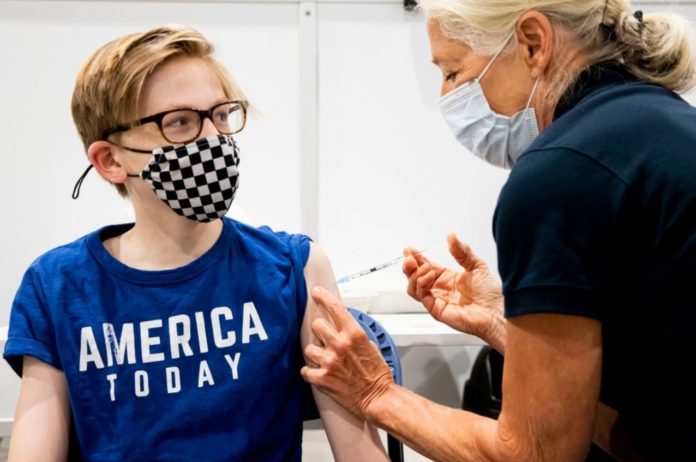The coronavirus has been turning the world upside down for a year and a half. It has become increasingly clear that it will probably not go away anymore. What scenarios are realistic instead?
In the journal “Nature”, scientists illustrate three possibilities.
You have to get used to the thought for better or worse: Experts assume that the coronavirus cannot be eradicated for the time being.
- Scientists in Fear of This New Predator From Red Sea Eating Native Species in Mediterranean
- Does This Mean We Stopped Being Animal and Started Being Human Due to ‘Copy Paste’ Errors?
- The One Lifestyle Choice That Could Reduce Your Heart Disease Risk By More Than 22%
- Aging: This Is What Happens Inside Your Body Right After Exercise
- Immune-Boosting Drink that Mimics Fasting to Reduce Fat – Scientists ‘Were Surprised’ By New Findings
But will the prominent position that Sars-CoV-2 has held for around a year and a half come to an end at some point? What are the other risks? A team of scientists wrote an article about this for the journal “Nature”.
The article begins optimistically by stating that it is realistic to expect that the pandemic will be brought under control thanks to global vaccination efforts.
The team of authors around Amalio Telenti and Davide Corti, who work for the pharmaceutical company Vir Biotechnology and various research institutions, also deal with unforeseeable developments and uncertainties.
Scenario 1: We cannot bring the virus under control for the foreseeable future
Of three conceivable scenarios that the team names, one is particularly worrying: That humanity cannot control the pandemic quickly and will continue to struggle with severe courses and a high number of infected people in the future – which in turn will favor the further development of the virus could.
A second and more likely scenario is the transition from Corona to a seasonal illness like the flu. Effective therapies such as antibody preparations made in the laboratory could help to massively reduce the severity of the disease and the rate of hospital admissions and deaths, the authors write.
Scenario 2: Covid-19 becomes a seasonal illness, comparable to the flu
Normal flu – that may sound harmless to some. The authors of the “Nature” article point out, however, that influenza is estimated to be associated with several hundred thousand deaths worldwide each year.
“This is an extremely significant health burden and corresponds to a relatively optimistic view of the future of the Sars-CoV-2 pandemic,” they state about this scenario.
Scenario 3: Corona weakens and turns into a harmless cold
As the third – and probably the most optimistic – option, the authors name the transition from corona to a disease with comparatively much less severe symptoms, similar to the well-known corona viruses. These are among the classic triggers of colds.
However, the authors emphasize several times that it is not possible to predict with certainty whether the severity of the disease will actually increase or decrease with further adaptation to humans and how long such a development could take.
The authors estimate that a possible development towards the flu or cold-like pathogen, perhaps with peaks in the winter months, should not occur until there is, among other things, a more widespread immunity in the population. Telenti and Corti also look at the influenza pandemic of 1918/19: descendants of the H1N1 pathogen would have caused epidemics well into the 1950s.
The development of variants that can escape the immune system of vaccinated and convalescent people also remains a risk, according to the article.
Because the pandemic is currently not or only incompletely under control in many regions of the world, there is a risk that more virus diversity will develop.
According to the authors, being able to predict such developments with new tools would be beneficial. They also highlight a possible role for animal species in which the virus could circulate and continue to change.
This is how other virologists assesses the situation
However, they note that so far a relatively limited number of mutations have appeared independently of one another in several variants, which indicates a convergent and possibly restricted evolution of Corona.
This coincides with the assessments of German virologist Christian Drosten: “From a virological point of view, there are good reasons to assume that Sars-CoV-2 does not have that much more in stock than what it has been able to show us so far,” he said recently in an interview with the Swiss online magazine “Republik“.
- Scientists in Fear of This New Predator From Red Sea Eating Native Species in Mediterranean
- Does This Mean We Stopped Being Animal and Started Being Human Due to ‘Copy Paste’ Errors?
- The One Lifestyle Choice That Could Reduce Your Heart Disease Risk By More Than 22%
- Aging: This Is What Happens Inside Your Body Right After Exercise
- Immune-Boosting Drink that Mimics Fasting to Reduce Fat – Scientists ‘Were Surprised’ By New Findings
Corona expert Drosten expects in the long term that Sars-CoV-2 will behave like a cold coronavirus.
Photo by Patrick van Katwijk/BSR Agency/Getty Images
